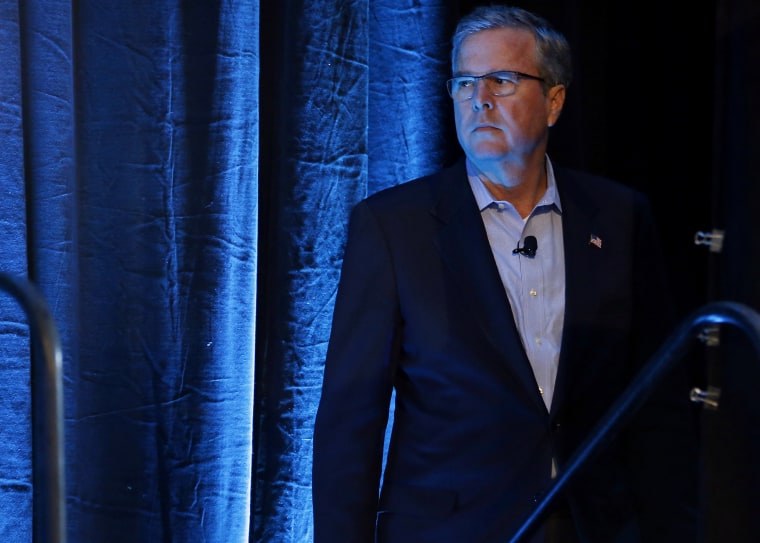NASHVILLE, Tennessee – After months defending his conservative bona fides on immigration and education, the National Rifle Association’s annual meeting must have come as a relief to Republican Jeb Bush. He has plenty to brag about to Second Amendment groups: He earned an A+ rating from the NRA as Florida governor and signed the “stand your ground” law that gained national attention after the Trayvon Martin shooting.
"I've been in the trenches with you and when I was governor, we were passing laws and creating protections for gun owners that set the bar for other states to follow," Bush said in his speech on Friday. "I will match my record against anyone else's when it comes to the support and defense of the Second Amendment."
But on one issue that has since become a top cause for gun control advocates (and the enemy of groups like the NRA), Bush’s policy choices may be out of step: background checks for gun purchases.
RELATED: Bush is ‘loathed’ by the tea party
In 1998, then-candidate Bush backed a Florida law instituting background checks for firearms bought at gun shows, a type of purchase that is not covered under federal law. The issue was part of a broader fight with Democratic opponent Buddy MacKay, who backed a constitutional amendment to allow individual counties to institute their own background check and waiting period laws. MacKay ran ads at the time arguing Bush "sides with the gun lobby and opposes criminal background checks," per The Miami Herald, a charge Bush rebutted to the local press by pointing to his support for a statewide law.
“A simple rule would simply say that anybody that buys a gun at a gun show should get an instant background check,” Bush said in a debate. “And so you would take out the criminals.”
“I will match my record against anyone else’s when it comes to the support and defense of the Second Amendment.”'
MacKay lost, but the amendment authorizing counties to expand background checks passed via referendum in the same election with 72% of the vote.
At the time, background checks for private sales were less controversial in the GOP – even NRA leader Wayne LaPierre testified that he could support them in 1999.
Background checks became a partisan lightning rod after the mass shooting at Sandy Hook Elementary School in Connecticut took the lives of 20 children and six adults, and President Obama urged Congress to pass a federal law closing the gun show loophole. LaPierre and the NRA lobbied hard against the proposal along with Senators Ted Cruz, Rand Paul and Marco Rubio – all likely 2016 candidates. The gun control measure ultimately failed.
Former Arkansas Gov. Mike Huckabee told msnbc as he shopped for a birthday gun for his wife at the NRA exhibition hall that he opposes the expanded background checks as well.
RELATED: Jeb Bush: All about that base
“I just have a real fear any time the government wants to get involved in the process of knowing who I am and why I have a firearm,” he said. “There's too much history that gives me pause.”
A spokeswoman for Bush, Kristy Campbell, did not directly answer a question on whether Bush still supports background checks at gun shows, but attested to his overall gun rights record.
"[As] demonstrated by his A+ rating from the NRA, Governor Bush's strong record on protecting and supporting second amendment rights is clear," Campbell told msnbc in an e-mail.
As LaPierre’s past support for closing the gun show loophole indicates, Bush’s position is a case of the political ground moving beneath his feet since he left office in early 2007, rather than a lurch to the left. But this is a phenomenon that could be a recurring issue for a presidential hopeful whose political rise, unlike almost every one of his expected rivals, took place entirely in the pre-Obama era of the party.
